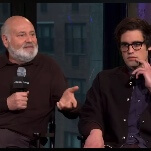There’s a mass of incongruities—some clever, others shockingly ill-conceived—in Noah Buschel’s The Missing Person, a neo-noir that attempts to update the genre while providing a self-conscious throwback to its tarted-up dialogue and grimy ambiance. Bridging the gap between eras is Michael Shannon, a strange, exciting character actor whose very presence tends to put a movie on edge; whenever he popped up as a mentally unstable truth-teller in Revolutionary Road, the film’s brittle marital drama suddenly dipped into chaos. Shannon is the perfect actor to play Buschel’s hard-drinking gumshoe. He can swill gin and mumble sardonic one-liners in the best Bogart tradition while suggesting a thoroughly modern creation, someone defiantly at odds with a culture he can’t comprehend. Shannon’s performance takes The Missing Person as far as it goes, but when a real-world tragedy commandeers the story, Buschel’s thin pastiche falls to pieces.
Occupying a shoddy one-room office/apartment near the el tracks in Chicago, where he persists on a diet of booze and instant coffee, Shannon isn’t in a position to turn down any private-detective work that comes his way, no matter how fishy. Early one morning, a liaison (Amy Ryan) to a powerful client offers him $500 a day to follow a middle-aged man (Frank Wood) on an Amtrak train from Chicago to Los Angeles and wherever else he goes from there. Shannon is immediately suspicious when he notices his mark traveling with a young Hispanic boy, and they deepen upon the discovery that the man’s disappearance has something to do with 9/11.
The idea of fusing 9/11 with modern noir makes a certain amount of sense: Just as the trauma and disillusionment that followed World War II gave rise to the noir genre in the first place, the preeminent American tragedy of our time could feed into its revival. But the war was always an unseen force in crime films, never tackled directly. The 9/11 references in The Missing Person introduce a raft of mawkish backstory that spoils an otherwise knowing portrait of an old-school detective who can’t function in a world where smoking is prohibited and cops mete out justice on Segways. It’s one thing for mass tragedy to infect the genre; it’s another when tragedy swallows it whole.























![HBO teases new Euphoria, Larry David, and much more in 2026 sizzle reel [Updated]](https://img.pastemagazine.com/wp-content/avuploads/2025/12/12100344/MixCollage-12-Dec-2025-09-56-AM-9137.jpg)

















